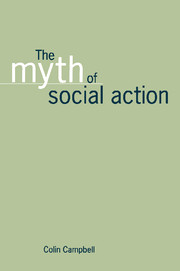Book contents
- Frontmatter
- Contents
- 1 Introduction
- 2 Action reported missing in action theory
- 3 Action and social action
- 4 Action versus social action
- 5 The rise of social situationalism
- 6 The argument by denial
- 7 Accounts and actions
- 8 The argument by exclusion
- 9 The argument through incorporation
- 10 The ‘learning everything from others’ thesis
- 11 The communicative act paradigm
- 12 The linguistic turn for the worse
- 13 The myth of social action
- 14 The obstacle which is social situationalism
- 15 Epilogue: bringing action back in
- Notes
- Bibliography
- Index
13 - The myth of social action
Published online by Cambridge University Press: 07 May 2010
- Frontmatter
- Contents
- 1 Introduction
- 2 Action reported missing in action theory
- 3 Action and social action
- 4 Action versus social action
- 5 The rise of social situationalism
- 6 The argument by denial
- 7 Accounts and actions
- 8 The argument by exclusion
- 9 The argument through incorporation
- 10 The ‘learning everything from others’ thesis
- 11 The communicative act paradigm
- 12 The linguistic turn for the worse
- 13 The myth of social action
- 14 The obstacle which is social situationalism
- 15 Epilogue: bringing action back in
- Notes
- Bibliography
- Index
Summary
As long as sociologists persist in regarding social action as their predominant subject-matter, there can be little hope of reviving interest in the subjective viewpoint and with it the action theory perspective as a whole. Consequently the key question which sociologists have to ask themselves is the one posed by the philosopher Don Locke. He asked whether there is ‘anything distinctive about social action which warrants a special theory’. In the present chapter we may also ask whether there is anything distinctive about social action which warrants a special concept. For if one accepts that ‘action’ is significantly different from ‘behaviour’ (as it would appear many sociologists are happy to do) then all the crucial questions do concern the concept of ‘social action’. For example, does the fact that action is ‘oriented to others’, or occurs ‘in a social situation’, or ‘embodies social meaning’, actually have any theoretical significance? Does it really follow that this form of action differs in any significant way from ‘non-social’ action? In order to answer these questions it is necessary to engage in a brief review of the various definitions of the term which have been proposed.
Firstly, there is the view that action should be considered to be social in so far as it embodies the intention of influencing others. Thus Duncan Mitchell declares that action is social when it ‘is intended to influence the actions of one or more other persons’.
- Type
- Chapter
- Information
- The Myth of Social Action , pp. 140 - 145Publisher: Cambridge University PressPrint publication year: 1996
- 1
- Cited by



